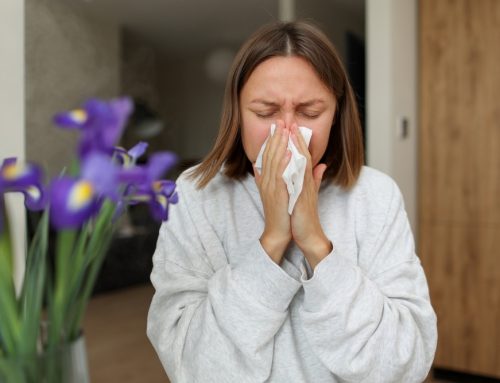Anxiety is the most commonly diagnosed mental condition in the United States, with 40 million adults having it. So, how do naturopathic doctors help with anxiety? Licensed naturopathic doctors (NDs) excel at treating anxiety because they focus on treating the whole person and addressing the condition’s underlying causes. NDs have a deep toolbox of evidence-based, natural therapies, like clinical nutrition, botanical medicine, and behavioral medicine.
Understanding Anxiety
Unique to every person, Generalized Anxiety Disorder (GAD) is often experienced as excessive, uncontrollable worry about a variety of topics in a manner far greater than their proposed risk. Common symptoms include chronic nervousness, agitation, a restless mind, muscle tension, racing heart, and sleep disturbance.
Anxiety can be caused by various things, from genetic to biological to environmental. Common treatments are prescription medications and/or therapy. Pharmaceutical drugs can provide some relief but often have limited effectiveness. As with any prescribed medication, some anxiety medications can be highly addictive and cause unwanted side effects. You should always stick to your prescription and talk to your doctor if you feel like it is becoming addicting.
Identifying underlying Causes of Anxiety
NDs address the underlying causes of anxiety, including neurological imbalances, digestive/microbiome dysfunction, and hypothalamic-pituitary-adrenal (HPA) axis dysfunction. An initial anxiety appointment with an ND often lasts an hour or more. It includes detailed family history, medical history, discussion of diet, physical activity, environmental exposures, sleep patterns, and psycho-emotional stressors. There are a wide variety of underlying causes of anxiety, and the ones naturopathic doctors consider are:
Genetic predisposition: Single nucleotide Polymorphisms (SNPs) are the most frequent type of mutation. NDs look at patterns in SNPs and see how they affect B vitamins, hormones, nutrients, and neurotransmitter production and breakdown. This information provides foundational support for treatment planning.
Neurological imbalance: The balance of chemicals in the brain helps control your mood and can play an important role in anxiety. Your ND will look for imbalances in serotonin, gamma-aminobutyric acid (GABA), and norepinephrine.

Digestive/microbiome dysfunction: The microbiome or ‘good germs’ that line your digestive tract play an important role in balancing your nervous, hormonal, and immune systems. Your ND may order a stool analysis to evaluate the health of your tract. You can also expect a detailed discussion of your diet and potential labs to identify food sensitivities and nutritional deficiencies.
Dysfunction of the hypothalamic-pituitary-adrenal (HPA) axis: Your HPA is your body’s response to stress. When you face chronic psychological stress, your adrenal glands release an abnormal amount of cortisol in an abnormal rhythm. The abnormal release is caused by blood sugar imbalance, lack of sleep, caffeine, toxins, and allergens. Your ND might order lab testing if they suspect this is the condition causing your anxiety.
Evidence-Based Naturopathic Medicine Treatments
Naturopathic doctors are trained in pharmacological treatments. NDs lead with minimally invasive therapies that are highly individualized and support the body to restore healthy function. When it is necessary to prescribe medication, genetic testing can help determine which medication will work with the least side effects. Naturopathic therapies include:
Improve Gut Health
Research has linked stress, fear, and anxiety-related behaviors with the gut-brain. It is important to have a nutritional and diverse diet supplemented with probiotics to maintain a healthy gut-brain. NDs have rigorous training in clinical nutrition to help you deal with food sensitivities and leaky gut.

Repair and Restore with Nutritional and Botanical Supplements
NDs utilize various evidence-based nutritional and botanical supplements for their calming effects. These supplements reduce the frequency, severity, and duration of panic attacks and anxiety. Effective supplements include Gamma-Aminobutyric acid (GABA), L-theanine, passionflower, Scutellaria lactiflora (skullcap), hops, Piper methysticum (kava), lavender, Withamnia Somnifera (ashwagandha), lithium orotate, and magnesium. Each treatment is individualized and evaluated carefully for the safety of each patient.
Manage Stress with Behavioral Medicine
NDs are trained to evaluate your symptoms in line with your lifestyle, behavior, and social-cultural environment. They can prescribe the most effective treatments by examining the details of your diet, stress level, sleep, physical activity, and more. Some behavioral medicine treatments and mind-body medicine techniques are mindfulness, therapeutic exercise/yoga, biofeedback, progressive muscle relaxation, breath work, and meditation.
Addressing repressed or current trauma has also played a significant role in treating anxiety. NDs specializing in mental health can offer energy-based therapies that focus on releasing trauma. These therapies include hypnotherapy, guided visualization, craniosacral therapy, and other specialized modalities.

Optimize Lifestyle Factors
NDs spend extra time getting to know you, so they can tailor recommendations to optimize lifestyle habits like sleep, diet, exercise, and reduction of stimulants. NDs evaluate and utilize strategies and therapies for different types of anxiety disorders, including anxiety in perimenopausal women, post-traumatic stress disorder (PTSD), obsessive-compulsive disorder (OCD), and panic disorder.
Reach Optimal Health with Moonstone Naturopathic
No one likes living with anxiety, but like many other mental disorders, it is something we have to adjust and manage. Thankfully, many treatments help alleviate the stress and discomfort that comes with anxiety. For more information on personalized, natural recommendations to help with anxiety, visit our Naturopathic practice! We would love to help you reach your optimal level of health! Contact Dr. Brandy McGill to make an appointment by calling (619) 784-3118 or clicking here.
*The content is not intended to be a substitute for professional medical advice, diagnosis, or treatment. Always seek the advice of your health provider.






